Trial in absentia is a criminal proceeding in a court of law in which the person being tried is not present. In absentia is Latin for "in (the) absence". Its interpretation varies by jurisdiction and legal system.

Saad Eddin Ibrahim was an Egyptian sociologist and author. He was one of Egypt's leading human rights and democracy activists and a strong critic of former Egyptian President Hosni Mubarak.

Ayman Abd El Aziz Nour is an Egyptian politician, a former member of the Egyptian Parliament, founder and chairman of the El Ghad party.

Egypt and the United States formally began relations in 1922 after Egypt gained nominal independence from the United Kingdom. Relations between both countries have largely been dictated by regional issues in the Middle East such as the Israeli–Palestinian conflict and Counterterrorism. But also domestic issues in Egypt regarding the country's human rights record and American support for the regimes of Hosni Mubarak and Abdel Fattah el-Sisi which the United States had come under controversy for in the aftermath of the 2011 Egyptian Revolution, and with many dissents of the current regime describing Sisi's rule as tyrannical.
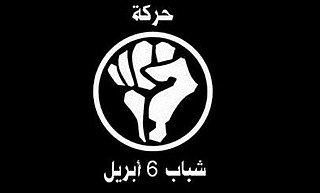
The April 6 Youth Movement is an Egyptian activist group established in Spring 2008 to support the workers in El-Mahalla El-Kubra, an industrial town, who were planning to strike on 6 April.

Democracy promotion by the United States aims to encourage governmental and non-governmental actors to pursue political reforms that will lead ultimately to democratic governance.

The 2011 Egyptian revolution, also known as the 25 January Revolution, began on 25 January 2011 and spread across Egypt. The date was set by various youth groups to coincide with the annual Egyptian "Police holiday" as a statement against increasing police brutality during the last few years of Hosni Mubarak's presidency. It consisted of demonstrations, marches, occupations of plazas, non-violent civil resistance, acts of civil disobedience and strikes. Millions of protesters from a range of socio-economic and religious backgrounds demanded the overthrow of Egyptian President Hosni Mubarak. Violent clashes between security forces and protesters resulted in at least 846 people killed and over 6,000 injured. Protesters retaliated by burning over 90 police stations across the country.

The Arab Spring or the First Arab Spring was a series of anti-government protests, uprisings and armed rebellions that spread across much of the Arab world in the early 2010s. It began in Tunisia in response to corruption and economic stagnation. From Tunisia, the protests then spread to five other countries: Libya, Egypt, Yemen, Syria and Bahrain. Rulers were deposed or major uprisings and social violence occurred including riots, civil wars, or insurgencies. Sustained street demonstrations took place in Morocco, Iraq, Algeria, Lebanon, Jordan, Kuwait, Oman and Sudan. Minor protests took place in Djibouti, Mauritania, Palestine, Saudi Arabia and the Moroccan-occupied Western Sahara. A major slogan of the demonstrators in the Arab world is ash-shaʻb yurīd isqāṭ an-niẓām!.

The Egyptian Crisis was a period that started with the Egyptian revolution of 2011 and ended with beginning of the presidency of Abdel Fattah el-Sisi in 2014. It was a tumultuous three years of political and social unrest, characterized by mass protests, a series of popular elections, deadly clashes, and military reinforcement. The events have had a lasting effect on the country's current course, its political system and its society.
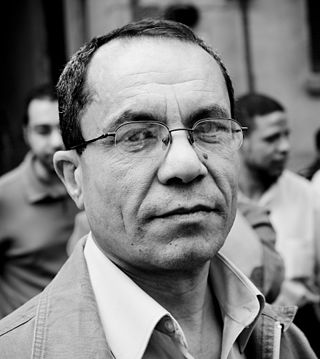
Kamal Abbas is General Coordinator of the Center for Trade Unions and Workers Services (CTUWS), an activist group for independent unions in Egypt. Involved in activism for over 20 years, Abbas has been active in mobilizing worker support during the Egyptian Revolution of 2011 and its aftermath. His approach emphasizes peaceful strikes and rallies accompanied by demands for better wages and working conditions, as well as more regular elections for union officials, and an independent union system.
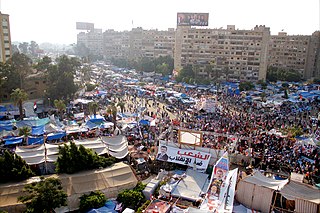
The 2013 Egyptian coup d'etat took place on 3 July 2013. Egyptian army chief General Abdel Fattah el-Sisi led a coalition to remove the democratically elected President of Egypt Mohamed Morsi from power and suspended the Egyptian constitution of 2012. The move came after the military's ultimatum for the government to "resolve its differences" with protesters during widespread national protests. The military arrested Morsi and Muslim Brotherhood leaders, and declared Chief Justice of the Supreme Constitutional Court Adly Mansour as the interim president of Egypt. The announcement was followed by demonstrations and clashes between supporters and opponents of the move throughout Egypt.
Mohammed Adel is an Egyptian political activist and a founder of the April 6 Youth Movement in Egypt. He has been active with the Kefaya movement since 2005 and is one of activists who called for a general strike on April 6, 2008. In 2009, Mohammed Adel became the April 6 movement's media spokesman. Between the time of the 2008 strike in Mahalla al-Kubra and the onset of the 2011 Egyptian Revolution, Mohemmad Adel enrolled in a training program directed by the Center for Non-Violent Action and Strategies, an entity founded by the Serbian pro-democracy youth movement Otpor!.
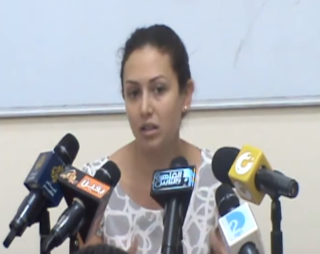
Yara Sallam is a prominent Egyptian feminist and human rights advocate. She has worked as a lawyer and researcher for several Egyptian and international human rights organizations, as well as for the African Commission on Human and Peoples’ Rights (ACHPR).

Mohamed Fadel Fahmy is an Egyptian-born Canadian journalist, war correspondent and author. He has worked extensively in the Middle East, North Africa, for CNN, BBC and Al Jazeera English.

The Tahrir Institute for Middle East Policy (TIMEP) is a nonpartisan, nonprofit organization dedicated to raising awareness of democratic transitions in the Middle East through analysis, advocacy, and action.
On December 29, 2013, three journalists working for the Qatari-based international news channel Al Jazeera English, Australian Peter Greste, Canadian Mohamed Fahmy and Egyptian Baher Mohamed were taken into custody by Egyptian security forces at the Marriott Hotel in Cairo following a raid at their room, which was used for the news channel's remote studio. The Egyptian Interior Ministry confirmed the arrest and said the journalists were accused of reporting news which was "damaging to national security".
Emad Shahin is an Egyptian professor of political science. He is currently a visiting professor at the School of Foreign Service at Georgetown University. He is editor-in-chief of The Oxford Encyclopedia of Islam and Politics, and professor of public policy at The American University in Cairo. His work focuses on Comparative Politics, Democracy and Political Reform in Muslim societies, Islam and Politics, and Political Economy of the Middle East.
The Arab Sharkas case is the name given to the military trial of nine men in Egypt in August 2014. Six defendants were sentenced to death in October, and executed in May 2015.
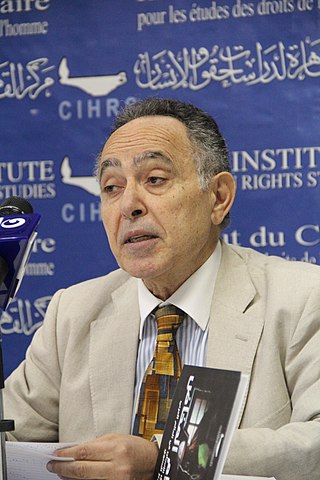
Bahey eldin Hassan is an Egyptian human rights defender and one of the founders of the Egyptian human rights movement in the 1980s. Hassan currently serves as the Director of the Cairo Institute for Human Rights Studies (CIHRS), which he cofounded in 1993. In 2014, and after receiving death threats for his human rights work, Hassan had to leave Egypt and currently lives in self-imposed exile in France. Hassan is also a journalist, lecturer, author and editor of several published articles, papers and books on human rights and democratic transformation in the Arab region.

Aya Hijazi is an Egyptian-American charity worker and social activist. Together with her husband she founded an NGO "Belady Foundation" to support child political prisoners in Egypt. Hijazi, her husband and five other Belady members were imprisoned in Cairo from 2014 until 2017, when the Cairo Criminal Court found them innocent.














